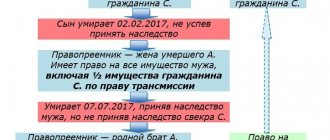Actual acceptance of inheritance: concept and features
The actual acceptance of an inheritance is the performance by a person of actions aimed at storing, owning, managing, and using property, which indicates his will and desire to receive the inheritance into personal possession.
Legislatively, inheritance issues are regulated by the Civil Code, Family Code and tax legislation. Additionally, there are methodological recommendations for registering inheritance rights, approved by the Board of the Federal Tax Fund on February 28, 2006. The document has lost legal force, but can be used as a reference on the legal features of the actual acceptance of inheritance rights.
Actions for storage, management and use of property can be performed not only by the heir, but also by third parties on his behalf. The order may be oral, but confirmed by explanations of third parties who performed these actions.
The advantage of actually accepting an inheritance is that after the death of the testator it is not necessary to submit an application to a notary to open inheritance proceedings. But these measures must be completed within the first six months from the date of death of the testator, that is, during the total period of receiving the inheritance.
Deadlines for accepting an inheritance
The general period for accepting an inheritance is six months. This time begins to be counted from the next day after the death of the testator or from the date specified in the court decision declaring the person dead.
Upon actual acceptance of the property, the heir is obliged, within six months from the date of death of the testator, to perform at least one of the actions indicating the desire to accept the property as personal property. The legislation does not limit the period during which you should contact a notary to obtain a notarial certificate of acquisition of property rights to an object.
Without obtaining a notarial certificate, it will not be possible to re-register property rights to the property, so you will be able to use the object, but you will not be able to dispose of it. Thus, sooner or later a person will have to contact a notary to obtain documents.
Ways to restore the deadline
After the expiration of the period allotted for accepting the inheritance, the successor loses his inheritance rights, but can restore them with the consent of other heirs or through the court.
By consent of the heirs
Consent to the extension of the period can be given by priority heirs who have already registered the property of the deceased. And only their unanimous permission will be valid - a negative response from at least one of the copyright holders will be tantamount to a refusal.
The permission must be in writing and signed personally by the heirs in the presence of a notary. Applications sent by mail or through an intermediary are also suitable, but in this case their signature must be notarized (not necessarily at the place where the inheritance was opened).
The result of the consent of the successors will be:
- cancellation of already issued certificates of the right to inheritance, and, at the same time, state registration of inherited property (if it was carried out);
- loss of inheritance rights by persons who acquired them as a result of non-acceptance of property by an heir who missed the deadline;
- return of inherited property and its distribution taking into account the new successor (by agreement or forcibly through the court);
- compensation of wasted inheritance within the share of the restored successor.
Consent is not a common occurrence and the reason for this lies in the consequences that it entails. But even if the heirs are extremely uninterested in the loss of the property they have already registered, justice can be achieved through judicial proceedings.
Through the court
Reinstatement of the term in court is possible only under the following conditions:
- There were good reasons for the absence.
- The events that caused the violation occurred throughout almost the entire period of inheritance.
- The heir announced the extension within 6 months from the day when the obstacles to this disappeared.
- The validity of the reasons has irrefutable evidence that the heir can provide to the court.
Situations may be considered valid when the heir did not know and could not know about the death of the testator, or he did not have the opportunity to make the acceptance in any of the available ways.
In this case, the obstacles to inheritance must be truly objective and insurmountable, that is, the successor could not take action to enter into the inheritance even remotely or through a representative.
An example of circumstances under which the court may restore the period for accepting an inheritance:
- serious illness;
- physical features that do not allow the successor to make the adoption on his own;
- incapacity;
- minority (except for emancipation);
- business trip;
- lack of knowledge about the death of the testator (the reason is controversial and can be considered valid only after a thorough analysis and the absence of contradictions).
The acquisition of inherited property on behalf of an incapacitated successor must be made by his representative - the parent of a minor, guardian or trustee of an incompetent, partially capable or child left without parental care. Responsibility for missing the deadline falls on them, because any legally significant action committed by the ward is invalid.
But the inaction of the representative should not become the basis for infringing on the legitimate property interests of an incapacitated citizen, and therefore, when applying to the court for the restoration of a deadline that was missed through no fault of his, there is a high probability of a successful outcome.
An heir who missed the deadline due to physical inability does not have legal representatives, and acceptance of the inheritance is a matter of his personal will. But due to circumstances, he is also dependent on the help of third parties, and its absence is sufficient grounds for extending the inheritance period.
USEFUL INFORMATION: Sale of real estate after inheritance tax in 2021
Necessary actions for actual acceptance of inheritance
A relative is considered to have accepted the inheritance if he has performed actions indicating a desire to receive the property into personal ownership.
Table “List of actions for actual acceptance of inheritance”
| Action | Peculiarities |
| Property management | Activities that are aimed at using the object, its protection, and preserving its integrity. For example, repairs, entry and accommodation, payment of utilities. |
| Ownership of property | Physical possession of property, including the ability to use the property (for example, living in an apartment, driving a vehicle, using household items that belonged to the testator, musical instruments and other personal belongings). Ownership of even part of the property can be considered as de facto acceptance of the entire property, regardless of where it is located. On October 20, 2003, a ruling was prepared by the judicial panel for civil cases of the Supreme Court of the Russian Federation, which stipulates that the use of property benefits by the heir indicates his actual entry into the inheritance. |
| Security of the object, protection from attacks | Installation of additional locks, installation of alarm systems. |
| Self-covering expenses and debts associated with property | Repayment of debts to individuals, loans, household loans, payment of utilities. |
| Cohabitation of heir and testator | Cohabitation with the testator means that the person actually takes ownership of the property in which they lived. This even applies to property to which the testator did not have property rights (for example, a social apartment that has not yet been privatized). |
| Shared property | If the heir and the testator jointly owned the object as shared ownership, then the shareholder is not considered to have entered into inheritance rights if after the death of the testator he continues to use his property. It is necessary to pay additional utility bills and carry out repairs. |
The actual acceptance of the inheritance is possible only in the absence of conflicts with other heirs. That is, a close relative will be able to receive a notarial certificate only after confirming that there are no other applicants for the property, the rights of other participants in legal relations are not limited, the rights of other participants in legal relations are not violated, and there are no conflicts with them.
Confirmation of actions
Resolution of the plenum of the Supreme Court of the Russian Federation dated April 23, 1991 No. 2 “On some issues arising in courts in inheritance cases” established that confirmation of the actual acceptance of an inheritance can be provided by documents indicating the implementation of actions aimed at the use, management, storage of inherited property property.
Documents confirming the implementation of special actions:
- a certificate from the housing and communal services or a certificate from local authorities confirming the joint residence of the heir and the testator until the day of his death;
- a document indicating the intended use of the object, for example, a garage, a plot of land, a summer house (a certificate can be obtained from the chairman of the cooperative, from the management authorities of a residential building, from the village council);
- a check confirming payment of taxes, utility bills, loan repayment for the deceased testator;
- agreements indicating the involvement of repair teams providing services for the repair of inherited property;
- commercial lease agreement;
- agreements for installation of alarm systems or paid security;
- Explanations from witnesses confirming that the heir used and managed the property.
The main task of such documents is not only to confirm the fact that the necessary actions have been taken, but also to indicate the time frame within which they were taken.
If certificates are obtained from state bodies, local governments, or legal entities, then they are drawn up on a special form indicating the person who prepared the document. The seal of the organization is required, and the date on which the document was prepared is also indicated.
If we are talking about contracts, then their originals or certified copies must be presented.
Payment receipts must be issued by the bank. Printing a financial receipt from a mobile bank is not allowed, that is, the document must have a signature and seal indicating its authenticity.
This is a general list, so the notary can independently establish a list of documents that will allow the heir to confirm the actual acceptance of the inheritance.
Sample statement of claim for restoration of the deadline for accepting an inheritance
Restoring the deadline for accepting an inheritance
What are the consequences of accepting, but not registering, an inheritance?
Accepted inherited property belongs to the recipient from the moment the inheritance is opened (Article 1152 of the Civil Code of the Russian Federation). Therefore, a person who has entered into an inheritance properly is the rightful owner of the objects. A certificate of inheritance rights is a document of title
However, the heir's property rights may be limited by federal law to the extent necessary to protect the rights and interests of other citizens. Therefore, state registration is a necessary stage in registering an inheritance.
In the absence of state registration papers, a citizen cannot carry out transactions with the property (sell, donate, lease). At the same time, a certificate of inheritance is sufficient to bequeath an object.
For an apartment, residential building, land plot
Law No. 218 of 2015 regulates the procedure for state registration of real estate. It does not establish liability for heirs who have not submitted an application to Rosreestr.
In addition, there is no deadline for submitting an application. The owner can carry out the procedure at any time convenient for himself.
However, when putting a property up for sale, difficulties may arise. If the buyer wants to check the purity of the transaction and submits a request to Rosreestr, he will receive information about the other owner. Such information may lead him to suspect fraudulent activities.
If the buyer does not object, then the object can be registered simultaneously with the submission of documents for registration of the transaction. To do this, the owner writes an application and pays the state fee.
For promotions
Registration of shares is carried out when data about the heir is entered into the register of shareholders. Changes are possible based on the certificate.
After registration of the inheritance, the citizen receives ownership of the shares. However, the main purpose of owning securities and shares is to receive a share of the company's profits (dividends).
In accordance with the law, the right to receive is vested in the shareholder. If the successor has not submitted an application to be included in the shareholders, then he has no right to payments.
Thus, a citizen can sell shares, donate, bequeath, but cannot receive dividends until the papers are properly executed.
To the enterprise
State registration of an enterprise or share in an LLC is carried out with the Federal Tax Service. If the testator was the sole founder, then the recipient must register as an individual entrepreneur or legal entity.
The citizen is deprived of the right to carry out entrepreneurial activities until proper registration. The law provides for administrative (Article 14.1 of the Code of Administrative Offenses of the Russian Federation) and criminal liability for illegal business (Article 171 of the Criminal Code of the Russian Federation).
Therefore, the successor may not register the object only in the event of an imminent sale. For example, if the share is bought out by other founders.
For car
The owner is obliged to register the vehicle within 10 days from the receipt of the certificate of inheritance rights. In case of violation of the deadline, administrative liability is imposed.
USEFUL INFORMATION: Financial assistance from the employer in 2020
Fines for violating the deadlines for vehicle registration
| No. | Sum | Defendant |
| 1 | 1 500 – 2 000 | For citizens |
| 2 | 2 000 – 3 500 | For officials |
| 3 | 5 000 – 10 000 | For legal entities |
Example. After the death of her father, citizen L. registered an inheritance with a notary. At the time of his death, his father owned a car, a house, and a dacha. Since her daughter did not know how to drive a vehicle, she parked the car in the garage at the dacha and forgot about it. A few years later she decided to sell it. To carry out a transaction with a vehicle, it must be registered. The woman paid the fine and carried out registration procedures, after which she was able to sell the car.
Actual acceptance of inheritance from a notary
The procedure for acquiring inheritance rights to property involves the following steps:
- the emergence of grounds for inheritance;
- within the established time frame, the implementation of one of the actions indicating the desire to own and use inherited benefits;
- obtaining a notarial certificate that makes it possible to re-register property rights to the object;
- re-registration of property benefits;
- actual disposal of property.
Contacting a notary is not necessary until a person wants to re-register property rights, since without a notarial certificate this will not be possible. It is extremely important to submit an application to a notary before the expiration of the six-month period if none of the heirs has expressed a desire to receive the property.
In the absence of a will, the notary prepares documents transferring property in favor of the state. This is escheatable property that the state can sell for its intended purpose. Therefore, in practice, there may be cases when, after some time, the actual heir begins to receive legal and justified demands to release the property or return it to the state.
Such situations are fraught with lengthy legal proceedings. Ultimately, the property is returned to the heir, but the person has additional financial expenses for legal costs and for collecting evidence. Therefore, it is much better to visit a notary within 6 months from the date of death of the testator, who will help to timely draw up documents confirming property rights.
Which notary office should I contact?
The Civil Code stipulates that it is necessary to contact the notary office located at the address of the last residence of the deceased testator. Lawyers accept an application from the heir, open inheritance proceedings, on the basis of which documents and a notarial certificate are prepared to obtain property rights to the object.
The notary, upon signature, acquaints the heir with his rights, obligations and legal consequences of accepting the property.
The approximate cost of making copies, opening an inheritance, registering an application, and preparing a notarial certificate will range from 1 thousand to 3 thousand rubles.
Contents of the statement
The application is written in free form by hand. As a rule, each notary already has his own form of address.
The application contains the following information:
- Full name of the testator;
- address of the deceased's last residence;
- Full name of the actual heir;
- relationship between the testator and the heir;
- name of the object, detailed technical characteristics in respect of which the person wants to enter into property rights;
- indication of the desire to accept the inheritance on the basis of actual ownership;
- clarification of actions indicating the actual acceptance of property;
- date and signature of the application.
State duty amount
The inheritance is not subject to tax, but the actual heir must pay a state fee. For close relatives, the amount will be 0.3% of the total price of the property.
For relatives of the second degree and beyond, for persons who were dependent on the deceased testator, the amount will be 0.6% of the value of the property. The price is confirmed by an assessment or cadastral documents.
State duty for issuing a certificate of inheritance
The amount of the state fee for issuing a certificate of the right to inheritance is established by Art. 333.24 of the Tax Code of the Russian Federation and amounts to:
- children, including adopted children, spouse, parents, full brothers and sisters of the testator - 0.3% of the value of the inherited property, but not more than one hundred thousand rubles;
- other heirs - 0.6% of the value of the inherited property, but not more than one million rubles.
The value of the property is determined by cadastral documents or by an appraisal agreement.
State duty upon entering into inheritance in 2021
Actual acceptance of inheritance in court
Disputes may arise with third parties claiming ownership, with a notary who refuses to issue a notarial certificate of receipt of property rights.
The basis for preparing a claim in court may be the missed deadline for re-registration of documents, in which the property is recognized as escheat and transferred to the benefit of the state. That is, a conflict arises between the actual heir and a state organization that wants to begin selling property benefits.
Jurisdiction
The claim may be heard by a magistrates' court or a federal court of general jurisdiction. The magistrate considers the claim if there is no other defendant party.
In this case, the magistrate prepares a court order, on the basis of which the notary will prepare a notarial certificate of transfer of property rights to the heir.
If a conflict has arisen between two parties (for example, different claimants to property), then the petition is sent to a federal court of general jurisdiction located at the location of the inheritance or at the location of the notary office that opened the inheritance proceedings.
Statement of claim for recognition of ownership rights
The statement of claim consists of the following parts:
- The header of the application, which contains the name of the court, the personal data of the applicant, and the personal data of the defendant, if this is an individual. The name of the document (statement of claim for the actual acceptance of the inheritance), date and place of its preparation.
- The introductory part, which indicates the grounds and causes of the conflict.
- A descriptive part containing a detailed description of the actions indicating the actual acceptance of property benefits, indicating a list of evidence that confirms the implementation of these measures.
- The section with legal requirements contains the person’s desire to recognize the inheritance as actually accepted and a request to allow it to be re-registered.
- The list of documents is a mandatory part of the statement of claim. In the absence of an inventory of the attached evidence, the court has the right to refuse to accept the claim for consideration.
It is extremely important to include the following information in the content of the statement of claim:
- list of actually accepted property;
- a list of actions aimed at safety (described in detail);
- an indication of the purpose of filing a statement of claim;
- indication of the date and signature of the citizen who is filing the appeal to the court.
Required documents
The application is supported by mandatory documents, including:
- plaintiff's passport;
- passport of the deceased testator;
- death certificate or court decision declaring deceased;
- receipt of payment of the state fee for filing a statement of claim in court;
- all documents confirming the actual acceptance of the inherited property;
- a written application to a notary to obtain a notarial certificate;
- official notarial refusal to issue a notarial certificate.
Arbitrage practice
The Civil Code states that the only basis for the actual acceptance of an inheritance is the absence of other claimants to the property, that is, complete confidence that no one will make claims to the benefits, that no one’s rights are limited or violated.
If the plaintiff was able to fully confirm the absence of claims from other persons and prove a list of actions aimed at the actual possession of the property and its safety, then the claims are satisfied, and the person takes possession of the property.
Lawyer's answers to questions about actual acceptance of inheritance
We have one registration with the deceased. We have lived in the same apartment for the last 5 years. What do I need to do to inherit an apartment?
If there are no others willing to receive the property, it is necessary to collect the required documents confirming joint residence. These could be receipts in your name for payment of utilities, a certificate from the municipality about cohabitation, explanations of witnesses confirming cohabitation, copies of contracts with the company managing the house. Every document in your name that confirms your residence in the apartment can serve as evidence. With these documents and a personal passport, the passport of the deceased testator, you will have to contact the territorial notary office, where the application for receiving the inheritance is sent.
I do not have documents to confirm the actions necessary to actually accept the inheritance. But there are witnesses who can confirm these actions. Is it possible to claim an inheritance in this case?
In the absence of a conflict situation and claims to property from third parties, one can hope to receive the property, but there must be at least 2 disinterested witnesses. If it is possible to obtain supporting documents in your situation, the notary will require them. For example, if there is a loan that you have not repaid, then the possibility of receiving an inheritance is very doubtful.
The deceased and I have different registered addresses, but after his death I maintained his property by living in it. Can I claim an inheritance?
Yes, but after collecting supporting documents.








